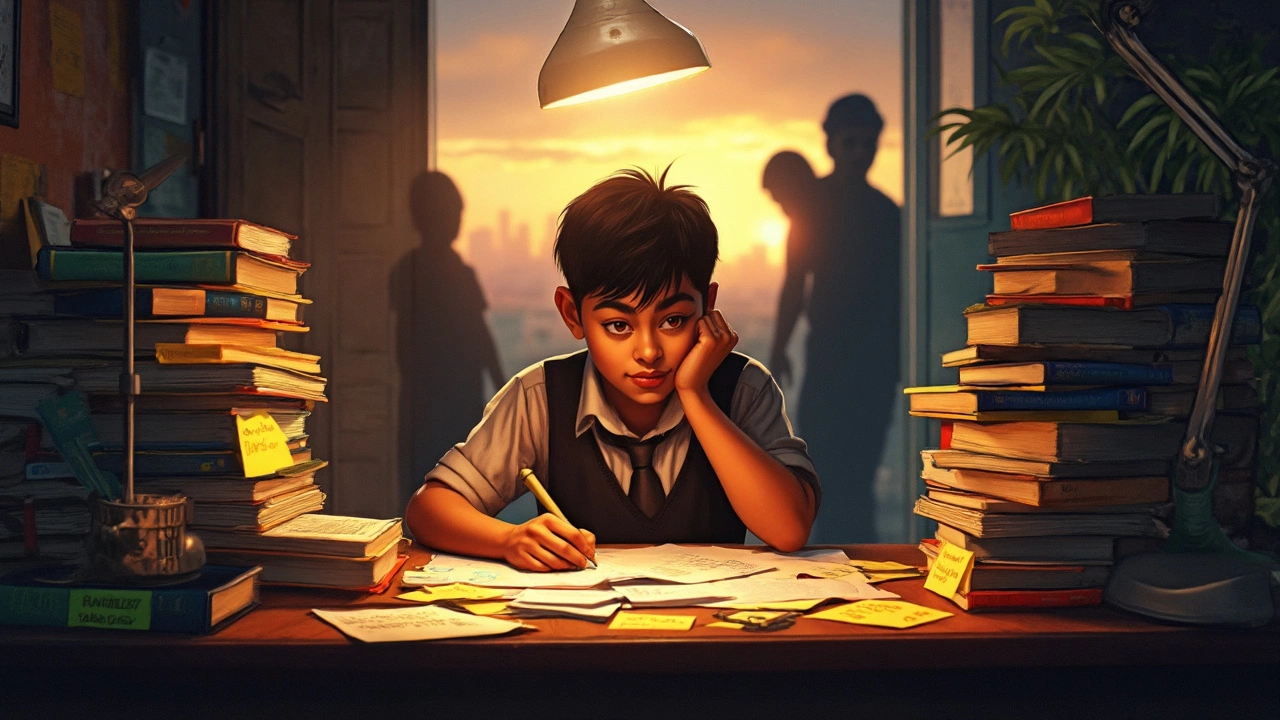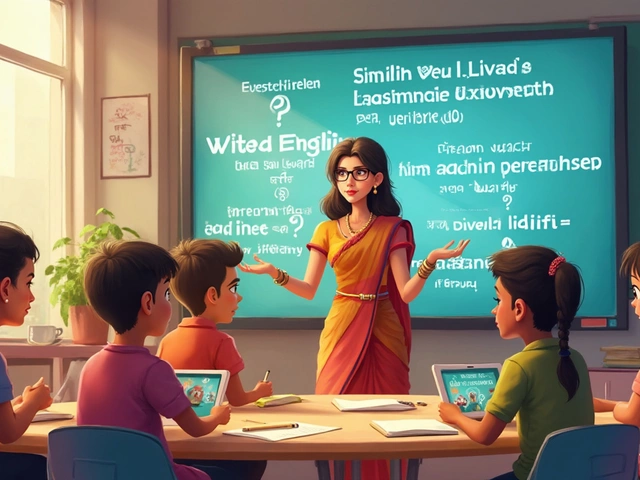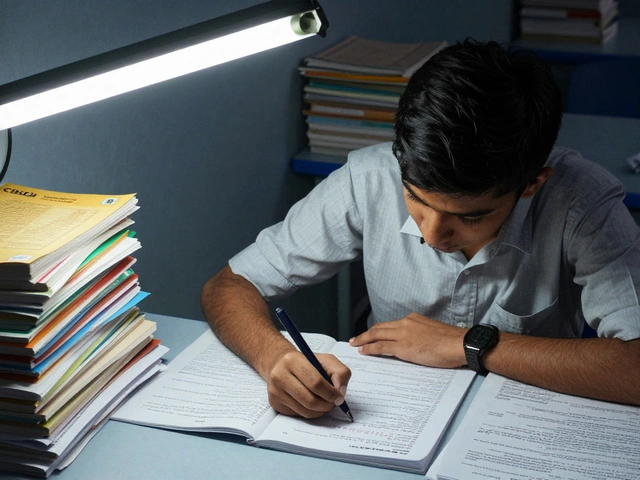Imagine an exam where students lock themselves in tiny rooms for days, parents camp outside schools hoping for good luck, and the whole country seems to pause, watching the outcome. Sounds unreal? This is a regular scene every June in China during the Gaokao—a two-day marathon that most call the world’s most stressful exam.
The numbers are wild. Over 12 million Chinese students register for the Gaokao each year, fighting for spots in top universities. Unlike other tests, this one decides almost everything: future jobs, social status, and sometimes even family expectations. No wonder everybody is on edge.
If you’ve ever stressed before a big exam, the pressure here is next level. Stories of students studying 14 hours a day, teachers taking turns to supervise midnight sessions, and cities banning construction noise during test days are not myths—they’re common facts. For many, failing isn’t just a setback. It can feel like the end of the road.
So, what can you learn from this? Even if you aren’t facing the Gaokao, understanding how thousands cope with this insane pressure can help tackle your own competitive exams. There are smart ways to deal with stress, keep your brain sharp, and avoid burnout. Stick around for tips you can actually use—not just empty pep-talks.
- What Makes an Exam the Most Stressful?
- Inside the Chinese Gaokao: The Ultimate Test
- Real Experiences: Stories of Stress and Survival
- Practical Tips for Smashing Stressful Exams
What Makes an Exam the Most Stressful?
Not every tough test qualifies as the most stressful exam. The real stress-factor doesn’t just come from tricky questions or thick textbooks. It’s a mix of what’s really at stake, the pressure from family and society, the competition, and even how much your whole future seems to hinge on a single day.
Let’s break down what turns an ordinary exam into a nightmare:
- High Stakes: When your entire life path changes based on how you do—like your career, social image, and even your parents’ pride—stress levels go through the roof. The Gaokao is famous for this. If you mess up, you might need to wait a whole year to try again.
- Lack of Second Chances: While many exams allow resits or have multiple rounds, some, like the Gaokao or India’s UPSC Civil Services, are “do or die.” One slip and it can set you back for years.
- Massive Competition: Exams like Gaokao, NEET (India), or South Korea’s Suneung put millions of students head-to-head, fighting over a limited number of seats. Getting into your dream university can feel like winning the lottery.
- Social Pressure: Imagine your relatives texting night and day for your score. Or your neighborhood holding a party if you ace the test — and awkwardly ignoring your family if you don’t. The community focus makes it way worse.
- Length and Intensity: Some exams don’t just test knowledge, they’re marathons. Gaokao runs for two insane days. Suneung lasts almost nine hours. Sitting that long does weird things to your brain (and nerves).
Here’s some striking data to show just how intense these competitive exams can be:
| Exam | No. of Test-Takers (Yearly) | Duration | Seats Available |
|---|---|---|---|
| Gaokao (China) | ~12 million | 2 days | <10% for top universities |
| NEET (India) | ~2.3 million | 3 hours | <8% for medical seats |
| Suneung (South Korea) | ~500,000 | 9 hours | Highly limited |
At the end of the day, what really makes the most stressful exam isn’t just what’s on paper. It’s about what it means to the people taking it, and the insane pressure cooker environment that builds around these competitive exams.
Inside the Chinese Gaokao: The Ultimate Test
If you think a tough competitive exam is just a matter of cramming and showing up, the Gaokao will prove you wrong. The most stressful exam in the world isn’t famous for nothing. Officially called the National College Entrance Examination, the Gaokao is the only ticket to quality higher education in China for most students.
This exam covers a bunch of core subjects—Chinese, Mathematics, a foreign language (mostly English), and options like Physics, History, Chemistry, or Politics, depending on what you want to study. You face all these in marathon sessions over two days that add up to more than 9 hours on average. Some provinces even stretch testing to three days.
The pressure? Absolutely bonkers. The whole country gets involved—hotels near schools are booked months in advance, and volunteers help guide traffic on exam mornings. Police cars escort late students through blocked traffic. In some cities, construction is banned and noise outside exam halls is strictly controlled. There are even stories about parents renting apartments near schools a year before the exam, just to save their kids a few minutes' commute.
Look at these numbers:
| Year | Gaokao Candidates | Acceptance Rate to Top Universities |
|---|---|---|
| 2022 | 11.93 million | <2% |
| 2023 | 12.6 million | <2% |
Scoring high isn’t just about getting into a good university. For many, it’s about social mobility and parental pride. Once results are out, they’re posted for everyone to see. No hiding from the outcome. Top scorers get their faces plastered on billboards, while those who don’t make the cut often repeat the year and try again—sometimes multiple times.
So when you hear about the most stressful exam on the planet, the Gaokao isn’t just notorious—it’s life-changing for millions.

Real Experiences: Stories of Stress and Survival
If you want to know what real pressure looks like, just talk to someone who's gone through the most stressful exam—especially the Gaokao. People in China still remember their exam days years later, down to the snacks they ate and the songs they heard on the radio. One student, Li Ming, shared how he spent his last month before the test: not a single day off, with study sessions starting at sunrise and sometimes stretching till midnight. His story isn’t unique—it’s actually pretty average.
It gets crazier. Some schools reportedly lock up students before the exam in what basically looks like a training camp. Teachers check in every hour, parents deliver home-cooked food through the gates, and local businesses put up motivational banners. During the exam week, cities cut down on traffic noise, and in some places, police escorts lead students into the school to keep them calm and on time.
How much sleep are students actually getting? On test days, surveys reveal that most Gaokao takers average just 5–6 hours of sleep per night the week before. Many report strange dreams about failing or getting lost on the way to the exam. There are reports every year of students fainting mid-exam from exhaustion or dehydration, and ambulances actually wait outside big test centers, just in case.
| Stress Factor | Common Reality in Gaokao |
|---|---|
| Study Time | 10–14 hours a day |
| Sleep before Exam | 5–6 hours a night |
| Applicants (2024) | Over 12.3 million students |
| Parent Anxiety | High—parents camp outside centers |
| Public Measures | Noise bans, extra police, medics on standby |
Post-exam, the relief is huge—families often take students out for their favorite foods, and school halls fill with laughter for the first time in months. Some former students say they haven’t felt that kind of pressure again in their lives, even during tough job interviews or big work presentations. If you’re ever facing your own competitive exams, remember: you’re not alone, and survival is definitely possible.
Practical Tips for Smashing Stressful Exams
When it comes to surviving the most stressful exam or any top-level competitive exams, you need more than just good notes and endless caffeine. Let’s get real—no magic hack will make it easy, but you can seriously boost your odds with the right moves.
"Gaokao is not just a test of what you know, it’s a test of how well you manage time and stress," says Professor Li Zhen from Tsinghua University.
Start by making a solid plan. Not just any timetable scribbled on a sticky note—think about your peak focus times, what subjects eat up your energy, and slot those in first. Break big topics into chunks. Even Gaokao toppers split their days into mini-goals, not ‘study until I drop’ marathons.
- Practice under pressure. Try mock exams in settings similar to the real deal: phone off, strict timing, even the same seat if you can swing it. This builds ‘exam muscle’ and reduces that deer-in-the-headlights feeling.
- Prioritize rest and fuel. According to a 2023 study by Shanghai’s National Children’s Medical Center, students who averaged 7+ hours of sleep performed up to 12% better in stressful exams. All-nighters mess with memory more than they help.
- Cut down on cramming the night before. Last-minute stuffing rarely sticks and just ramps up your anxiety. Go for light reviews—flashcards, formulas, your own cheat-sheet summaries.
- Buddy up, but smartly. Study groups work best for things like quizzing each other or tricky concepts, not for aimless chatting. Pick classmates who keep you honest.
Little habits matter, too. Keep water nearby—dehydration actually makes you forget stuff. Don’t skip breakfast on exam day; a bowl of oats or eggs keeps you sharp by avoiding energy crashes.
| Tip | Benefit |
|---|---|
| Mock Tests Weekly | Boosts familiarity, cuts panic |
| 7+ Hours Sleep | Improves memory and focus |
| Healthy Snacks | Prevents energy dips |
Finally, recognize that it’s normal to feel tense before a most stressful exam. Stress means you care. The trick is to use that adrenaline to focus, not freeze. If it feels overwhelming, talk to someone: school counselor, teacher, or just a friend. After all, you’re not the only one riding this crazy wave.









0 Comments